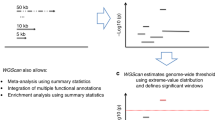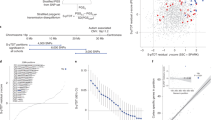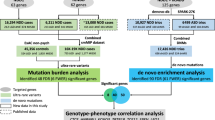Abstract
Arising from I. F. King et al. Nature 501, 58–62 (2013); doi:10.1038/nature12504
In an important recent paper, King et al.1 reported that inhibition of TOP1 and other topoisomerases reduces the expression of extremely long genes. They also showed that the list of large genes affected by TOP1 inhibition is enriched with candidate genes for autism spectrum disorders (ASD); however, the list of candidate genes that was used contains many genes with limited evidence for association with ASD2. Here we demonstrate that the size of the genes among ASD candidate genes is biased towards extremely large genes only for genes identified to be disrupted by copy number variations (CNVs). Thus, our analysis suggests that the association between large genes and ASD is mainly driven by the method that implicated the genes in ASD. There is a Reply to this Brief Communication Arising by Zylka, M. J. et al. Nature 512, http://dx.doi.org/10.1038/nature13584 (2014).
This is a preview of subscription content, access via your institution
Access options
Subscribe to this journal
Receive 51 print issues and online access
$199.00 per year
only $3.90 per issue
Buy this article
- Purchase on Springer Link
- Instant access to full article PDF
Prices may be subject to local taxes which are calculated during checkout

Similar content being viewed by others
References
King, I. F. et al. Topoisomerases facilitate transcription of long genes linked to autism. Nature 501, 58–62 (2013)
Abrahams, B. S. et al. SFARI Gene 2.0: a community-driven knowledgebase for the autism spectrum disorders (ASDs). Mol. Autism 4, 36 (2013)
Levy, D. et al. Rare de novo and transmitted copy-number variation in autistic spectrum disorders. Neuron 70, 886–897 (2011)
Sanders, S. J. et al. Multiple recurrent de novo CNVs, including duplications of the 7q11.23 Williams syndrome region, are strongly associated with autism. Neuron 70, 863–885 (2011)
Iossifov, I. et al. De novo gene disruptions in children on the autistic spectrum. Neuron 74, 285–299 (2012)
Neale, B. M. et al. Patterns and rates of exonic de novo mutations in autism spectrum disorders. Nature 485, 242–245 (2012)
O’Roak, B. J. et al. Sporadic autism exomes reveal a highly interconnected protein network of de novo mutations. Nature 485, 246–250 (2012)
Sanders, S. J. et al. De novo mutations revealed by whole-exome sequencing are strongly associated with autism. Nature 485, 237–241 (2012)
Ben-David, E. et al. Identification of a functional rare variant in autism using genome-wide screen for monoallelic expression. Hum. Mol. Genet. 20, 3632–3641 (2011)
Author information
Authors and Affiliations
Contributions
Both authors conceived the project, analysed the data and wrote the paper.
Corresponding author
Ethics declarations
Competing interests
Competing Financial Interests Declared none.
PowerPoint slides
Rights and permissions
About this article
Cite this article
Shohat, S., Shifman, S. Bias towards large genes in autism. Nature 512, E1–E2 (2014). https://doi.org/10.1038/nature13583
Received:
Accepted:
Published:
Issue Date:
DOI: https://doi.org/10.1038/nature13583
This article is cited by
-
Excess ribosomal protein production unbalances translation in a model of Fragile X Syndrome
Nature Communications (2022)
-
Length-dependent gene misexpression is associated with Alzheimer’s disease progression
Scientific Reports (2017)
-
Clinical relevance of host immunity in breast cancer: from TILs to the clinic
Nature Reviews Clinical Oncology (2016)
-
An Automated High-throughput Array Microscope for Cancer Cell Mechanics
Scientific Reports (2016)
-
The Unique Evolutionary Signature of Genes Associated with Autism Spectrum Disorder
Behavior Genetics (2016)
Comments
By submitting a comment you agree to abide by our Terms and Community Guidelines. If you find something abusive or that does not comply with our terms or guidelines please flag it as inappropriate.



